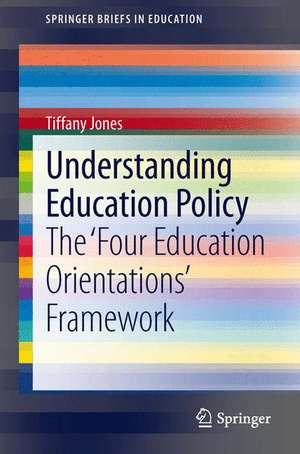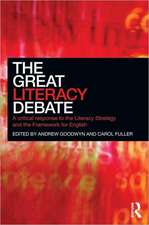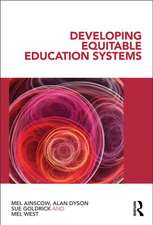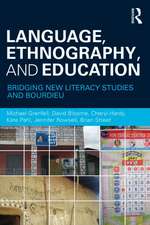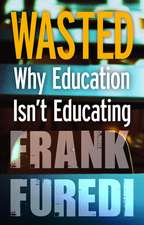Understanding Education Policy: The ‘Four Education Orientations’ Framework: SpringerBriefs in Education
Autor Tiffany Jonesen Limba Engleză Paperback – 9 mar 2013
Understanding Education Policy provides an overarching framework of four key orientations that lie beneath much policy analysis, yet are rarely used with accuracy: conservative, liberal, critical and post-modern. It details each orientation's application to policy making, implementation and overall impact. The book also argues the value of analysing a policy’s orientation to improve the clarity of its analysis and allow broader trends across the education policy field to emerge.
The book offers practical examples, key vocabulary and reflection activities which give equitable, yet critical consideration to all education orientations. This allows readers to see the benefits and disadvantages of each perspective and discover their own biases.
This introduction to education policy analysis offers theoretically broad, highly practical coverage. It is adaptable to many kinds of policy analysis areas and will appeal to a wide range of readers with an interest in education policy, from students conducting specific research to policy makers looking for a deeper way to re-think their work.
Din seria SpringerBriefs in Education
-
 Preț: 317.28 lei
Preț: 317.28 lei -
 Preț: 478.71 lei
Preț: 478.71 lei - 20%
 Preț: 387.43 lei
Preț: 387.43 lei - 17%
 Preț: 392.10 lei
Preț: 392.10 lei -
 Preț: 196.30 lei
Preț: 196.30 lei -
 Preț: 394.40 lei
Preț: 394.40 lei -
 Preț: 356.31 lei
Preț: 356.31 lei -
 Preț: 444.52 lei
Preț: 444.52 lei -
 Preț: 196.15 lei
Preț: 196.15 lei -
 Preț: 262.86 lei
Preț: 262.86 lei -
 Preț: 370.60 lei
Preț: 370.60 lei -
 Preț: 376.59 lei
Preț: 376.59 lei -
 Preț: 379.68 lei
Preț: 379.68 lei -
 Preț: 408.44 lei
Preț: 408.44 lei -
 Preț: 376.22 lei
Preț: 376.22 lei -
 Preț: 378.34 lei
Preț: 378.34 lei -
 Preț: 346.59 lei
Preț: 346.59 lei -
 Preț: 377.18 lei
Preț: 377.18 lei -
 Preț: 377.35 lei
Preț: 377.35 lei -
 Preț: 476.03 lei
Preț: 476.03 lei -
 Preț: 376.43 lei
Preț: 376.43 lei -
 Preț: 379.48 lei
Preț: 379.48 lei -
 Preț: 446.08 lei
Preț: 446.08 lei -
 Preț: 340.61 lei
Preț: 340.61 lei -
 Preț: 377.18 lei
Preț: 377.18 lei -
 Preț: 377.57 lei
Preț: 377.57 lei -
 Preț: 376.59 lei
Preț: 376.59 lei -
 Preț: 377.18 lei
Preț: 377.18 lei -
 Preț: 380.84 lei
Preț: 380.84 lei -
 Preț: 379.09 lei
Preț: 379.09 lei -
 Preț: 354.09 lei
Preț: 354.09 lei -
 Preț: 377.95 lei
Preț: 377.95 lei -
 Preț: 379.68 lei
Preț: 379.68 lei -
 Preț: 377.35 lei
Preț: 377.35 lei -
 Preț: 346.59 lei
Preț: 346.59 lei -
 Preț: 444.52 lei
Preț: 444.52 lei -
 Preț: 376.22 lei
Preț: 376.22 lei -
 Preț: 381.21 lei
Preț: 381.21 lei -
 Preț: 348.13 lei
Preț: 348.13 lei -
 Preț: 409.25 lei
Preț: 409.25 lei -
 Preț: 410.17 lei
Preț: 410.17 lei -
 Preț: 377.57 lei
Preț: 377.57 lei -
 Preț: 380.63 lei
Preț: 380.63 lei -
 Preț: 376.59 lei
Preț: 376.59 lei -
 Preț: 377.57 lei
Preț: 377.57 lei -
 Preț: 380.07 lei
Preț: 380.07 lei -
 Preț: 378.54 lei
Preț: 378.54 lei -
 Preț: 379.48 lei
Preț: 379.48 lei -
 Preț: 377.73 lei
Preț: 377.73 lei -
 Preț: 342.74 lei
Preț: 342.74 lei
Preț: 460.75 lei
Preț vechi: 542.06 lei
-15% Nou
Puncte Express: 691
Preț estimativ în valută:
88.17€ • 90.30$ • 73.35£
88.17€ • 90.30$ • 73.35£
Carte tipărită la comandă
Livrare economică 19 martie-02 aprilie
Preluare comenzi: 021 569.72.76
Specificații
ISBN-13: 9789400762640
ISBN-10: 940076264X
Pagini: 84
Ilustrații: IX, 71 p. 2 illus.
Dimensiuni: 155 x 235 x 4 mm
Greutate: 0.13 kg
Ediția:2013
Editura: SPRINGER NETHERLANDS
Colecția Springer
Seria SpringerBriefs in Education
Locul publicării:Dordrecht, Netherlands
ISBN-10: 940076264X
Pagini: 84
Ilustrații: IX, 71 p. 2 illus.
Dimensiuni: 155 x 235 x 4 mm
Greutate: 0.13 kg
Ediția:2013
Editura: SPRINGER NETHERLANDS
Colecția Springer
Seria SpringerBriefs in Education
Locul publicării:Dordrecht, Netherlands
Public țintă
ResearchCuprins
1. Introduction.- 2. Perceptions of Policy.- 3. Policy Paradigms Frameworks: Gaps Within Research.- 4. The Four Orientations to Education Framework.
Recenzii
Professor Jones reminds us that the term “educational policy” is typically used as if it were definitive when it really is not. She then moves on to provide definition and taxonomy that has a solid and very useful theoretical grounding for sorting and analyzing various policy initiatives.
Professor Daniel W. Lang, University of Toronto, Toronto, Ontario, Canada
Professor Daniel W. Lang, University of Toronto, Toronto, Ontario, Canada
Textul de pe ultima copertă
Analysis of education policy often follows a particular orientation, such as conservative or neo-liberal. Yet, readers are often left to wonder the true meaning and conceptual framing behind these orientations. Without this knowledge, the policy analysis lacks true rigor, its value is diminished as the results may prove difficult to reproduce.
Understanding Education Policy provides an overarching framework of four key orientations that lie beneath much policy analysis, yet are rarely used with accuracy: conservative, liberal, critical and post-modern. It details each orientation's application to policy making, implementation and overall impact. The book also argues the value of analysing a policy’s orientation to improve the clarity of its analysis and allow broader trends across the education policy field to emerge.
The book offers practical examples, key vocabulary and reflection activities which give equitable, yet critical consideration to all education orientations. This allows readers to see the benefits and disadvantages of each perspective and discover their own biases.
This introduction to education policy analysis offers theoretically broad, highly practical coverage. It is adaptable to many kinds of policy analysis areas and will appeal to a wide range of readers with an interest in education policy, from students conducting specific research to policy makers looking for a deeper way to re-think their work.
Understanding Education Policy provides an overarching framework of four key orientations that lie beneath much policy analysis, yet are rarely used with accuracy: conservative, liberal, critical and post-modern. It details each orientation's application to policy making, implementation and overall impact. The book also argues the value of analysing a policy’s orientation to improve the clarity of its analysis and allow broader trends across the education policy field to emerge.
The book offers practical examples, key vocabulary and reflection activities which give equitable, yet critical consideration to all education orientations. This allows readers to see the benefits and disadvantages of each perspective and discover their own biases.
This introduction to education policy analysis offers theoretically broad, highly practical coverage. It is adaptable to many kinds of policy analysis areas and will appeal to a wide range of readers with an interest in education policy, from students conducting specific research to policy makers looking for a deeper way to re-think their work.
Caracteristici
First book on education policy analysis in a theoretically broad and practical manner Represents a new theorisation of the policy field, or ‘new knowledge’’ Explains existing terms often used in research but poorly defined in the field Includes practical examples, key vocabulary and reflection activities? Includes supplementary material: sn.pub/extras
